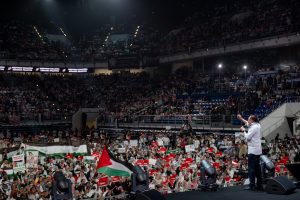The United States has in recent weeks been pressuring Malaysia to change its position on the Israel-Hamas war, Malaysia’s Prime Minister Anwar Ibrahim said on Tuesday, a sign of the conflict’s ramifying global political and diplomatic impacts.
In an address to Parliament on Tuesday, BenarNews reported, the Malaysian leader revealed that the Foreign Ministry had received two formal démarches from the U.S. Embassy – on October 13 and October 30 – urging it to label Hamas a terrorist group. He also said that Malaysia’s ambassador to Washington was summoned on October 18 by the State Department, “which raised concerns about our stance on the Israel-Palestine issue, especially regarding Israel’s actions in Gaza,” Anwar said.
Repeating comments that he has made previously, Anwar told the assembled MPs that his government would not give in to any coercion. “Malaysia will not change its stance, particularly our reluctance to consider Hamas as a terrorist group,” Anwar told the assembled MPs. “Malaysia maintains its independent position.”
Malaysia has been outspoken in support of the Palestinian cause since the outbreak of the current conflict on October 7, when Hamas militants launched gruesome attacks on Israeli civilian settlements adjacent to the Gaza Strip. Speaking at a large pro-Palestine rally in Kuala Lumpur on October 24, Anwar described the ruthless Israeli response, which has involved air attacks and now a ground operation in Gaza, as “the height of barbarism in this world,” and called on Israel to end its occupation of Palestinian territories.
Anwar’s stance reflects Malaysia’s longstanding, and largely bipartisan, support for the Palestinian cause. The nation has refused to establish diplomatic relations with Israel, and has maintained close relations with Hamas, despite the frequent changes of government over the past five years. In mid-October, Anwar held a call with Ismail Haniyeh, the head of Hamas’ political bureau, during which he expressed Malaysia’s unwavering support for the Palestinian people.
It is perhaps no surprise that the U.S. would make formal representations to the Malaysian government over its support for Hamas, given the priority that the Biden administration has placed on supporting Israel’s counter-offensive. Whether it expects much to come of this is another question.
Assuming that Anwar is characterizing the recent U.S. diplomatic pressure accurately, it is tempting to view it as a sign of how the outbreak of conflict in the Middle East is drawing American attention away from the supposed priority of the “Indo-Pacific.”
As I have argued previously, however, Malaysia’s position on the Israel-Palestine conflict, and Kuala Lumpur’s engagement with Hamas, is long-standing. While Anwar’s pro-Hamas stance may be distasteful to the U.S. government, U.S. diplomats no doubt recognize the fact that it is firmly rooted in the country’s domestic politics, and that Anwar could pay a heavy political price for moderating his position at this crucial moment.
The fact that the U.S. has not been public in its criticism suggests, first, that it does not expect Malaysia to change its position, and second, that is unwilling to expend political capital in order to induce it to do so. As such, the wide gulf between Malaysia and its Western partners is unlikely to have a marked impact on their diplomatic relationships.

































